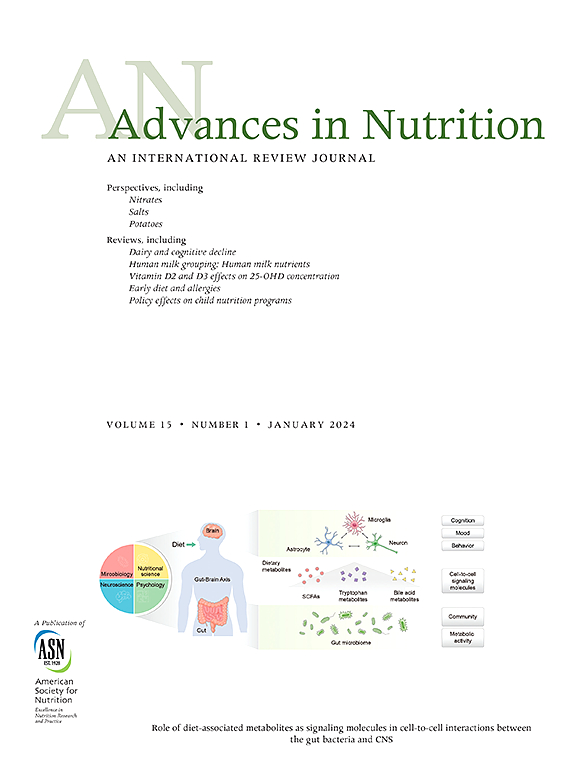食物强化对非洲育龄妇女微量营养素摄入和营养状况的影响-叙述综述。
IF 9.2
1区 医学
Q1 NUTRITION & DIETETICS
引用次数: 0
摘要
据估计,非洲超过三分之二的育龄妇女缺乏微量营养素。这在很大程度上是由于普遍的饮食质量差和营养密集的食物摄入量不足,无法满足WRA的更高要求。在非洲等低收入环境中,强化食品是解决这些微量营养素缺乏问题的一种具有成本效益和强烈推荐的以食物为基础的方法。30多年来,该战略在该区域内以不同规模实施。我们进行了一项审查,以寻找在非洲不同规模和不同人口情况下实施食品强化的影响的证据。我们还试图了解哪些因素可能会限制正在进行的强化计划对微量营养素状况的影响。我们还探讨了关于非洲人口中强化食品的知识和可接受性的发现,作为食品强化对营养状况影响的进一步障碍。我们发现,铁和维生素A的强化与有针对性的大规模强化计划的影响最为不同。然而,在非洲妇女中,叶酸、碘和锌的食物强化对营养状况和血清生物标志物有显著的积极影响。一般来说,消费者可以接受强化食品;然而,评估强化食品知识和偏好的调查发现,世界卫生组织对食品强化及其益处知之甚少。强化覆盖率低、强化剂水平低于建议水平以及使用非世卫组织推荐的强化剂,限制了食物强化对非洲世界粮食计划署微量营养素摄入量和状况的影响。重要意义:本综述强调了食品强化在改善WRA中必需和普遍缺乏的微量营养素摄入方面的潜力,以及目前在WRA中全球微量营养素缺乏负担最重的非洲地区限制这一潜力的因素。本文章由计算机程序翻译,如有差异,请以英文原文为准。
Impacts of Food Fortification on Micronutrient Intake and Nutritional Status of Women of Reproductive Age in Africa—A Narrative Review
More than two-thirds of women of reproductive age (WRA) in Africa are estimated to be micronutrient deficient. This is largely due to the widespread poor dietary quality and inadequate intakes of nutrient-dense foods to meet the heightened requirements for WRA. Food fortification is a cost-effective and highly recommended food-based approach for addressing these micronutrient deficiencies in low-income settings like Africa. The strategy has been implemented at different scales within the region for over 3 decades. We conducted a review to find evidence of the impact of food fortification implemented at various scales and across different population circumstances in Africa. We also sought to understand what factors may limit the impact of ongoing fortification programs on micronutrient status. We also explored findings regarding the knowledge and acceptability of fortified foods within the African population as a further barrier to the impact of food fortification on nutritional status. We found that fortification with iron and vitamin A was associated with the most variable impact from targeted and large-scale fortification programs. However, significant positive effects on nutritional status and serum biomarkers were found for food fortification with folate, iodine, and zinc among African women. Generally, fortified foods are acceptable to consumers; however, surveys assessing knowledge and preference for fortified foods found that WRA know little about food fortification and its benefits. Poor coverage of fortification, lower levels of fortificants than are recommended, and use of non-World Health Organization recommended fortificants limit the impact of food fortification on micronutrient intakes and status among WRA in Africa.
求助全文
通过发布文献求助,成功后即可免费获取论文全文。
去求助
来源期刊

Advances in Nutrition
医学-营养学
CiteScore
17.40
自引率
2.20%
发文量
117
审稿时长
56 days
期刊介绍:
Advances in Nutrition (AN/Adv Nutr) publishes focused reviews on pivotal findings and recent research across all domains relevant to nutritional scientists and biomedical researchers. This encompasses nutrition-related research spanning biochemical, molecular, and genetic studies using experimental animal models, domestic animals, and human subjects. The journal also emphasizes clinical nutrition, epidemiology and public health, and nutrition education. Review articles concentrate on recent progress rather than broad historical developments.
In addition to review articles, AN includes Perspectives, Letters to the Editor, and supplements. Supplement proposals require pre-approval by the editor before submission. The journal features reports and position papers from the American Society for Nutrition, summaries of major government and foundation reports, and Nutrient Information briefs providing crucial details about dietary requirements, food sources, deficiencies, and other essential nutrient information. All submissions with scientific content undergo peer review by the Editors or their designees prior to acceptance for publication.
 求助内容:
求助内容: 应助结果提醒方式:
应助结果提醒方式:


